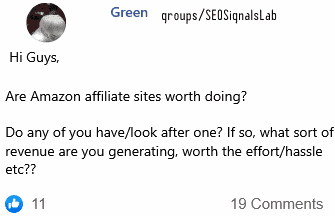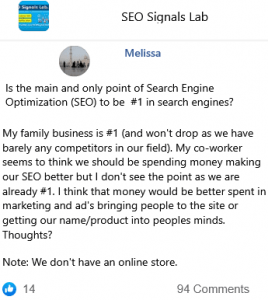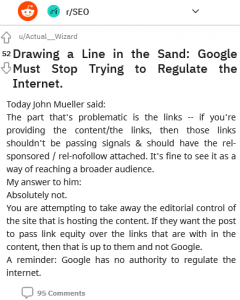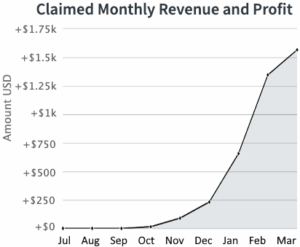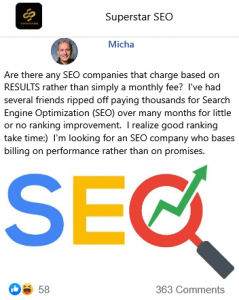Green
Hi Guys,
Are Amazon affiliate sites worth doing?
Do any of you have/look after one? If so, what sort of revenue are you generating, worth the effort/hassle etc??
11 👍🏽11
19 💬🗨
Hi Guys,
Are Amazon affiliate sites worth doing?
Do any of you have/look after one? If so, what sort of revenue are you generating, worth the effort/hassle etc??
11 👍🏽11
19 💬🗨
📰👈
Ammon Johns 🎓
I'd always suggest that the best way to do affiliate sites is to build them around your knowledge and content expertise, and/or your ability to build an audience of a specific demographic.
What I mean by that is that the best way to do affiliate sites is to NOT be tied to just one program or partner, and to have the option to pick and choose the best program for monetization as their offers change.
The great thing about Amazon is obviously the brand. Your market has always heard of them, many will already have accounts with them, and so conversion rates can reflect that higher trust and familiarity.
The flip-side to that is that Amazon is so famous that if someone wants to buy something they often start there first, and may have already seen that before landing on smaller affiliate sites. You could be showing users stuff they either already bought, or stuff they already turned down. And that hold on consumers is reflected in the very poor affiliate rates Amazon offer.
I know people who still make good money on Amazon, and people who long ago gave up sites they'd invested a lot into because it flat-out wasn't worthwhile. The difference between those experiences wasn't in Amazon, but in the demographic targeted, and what the site brought to the table.
💟👍🏽22
I'd always suggest that the best way to do affiliate sites is to build them around your knowledge and content expertise, and/or your ability to build an audience of a specific demographic.
What I mean by that is that the best way to do affiliate sites is to NOT be tied to just one program or partner, and to have the option to pick and choose the best program for monetization as their offers change.
The great thing about Amazon is obviously the brand. Your market has always heard of them, many will already have accounts with them, and so conversion rates can reflect that higher trust and familiarity.
The flip-side to that is that Amazon is so famous that if someone wants to buy something they often start there first, and may have already seen that before landing on smaller affiliate sites. You could be showing users stuff they either already bought, or stuff they already turned down. And that hold on consumers is reflected in the very poor affiliate rates Amazon offer.
I know people who still make good money on Amazon, and people who long ago gave up sites they'd invested a lot into because it flat-out wasn't worthwhile. The difference between those experiences wasn't in Amazon, but in the demographic targeted, and what the site brought to the table.
💟👍🏽22
Green ✍️ » Ammon Johns
As always, a great answer. Thanks 🙂
As always, a great answer. Thanks 🙂
Brikiatis
With Apple and soon others giving people the ability to opt out of cookies, all affiliates that use tracking cookies are going to be making less and less money.
Ammon Johns 🎓 » Brikiatis
People have had the ability, clearly made, to opt out of cookies for decades now. For a while, certain players used super-cookies (that were not really cookies) as a workaround for this fact. However, the EU passed privacy laws long ago that mean ALL users have to specifically accept cookies, and it is illegal for any site to use cookies without such consent – backed up with quite serious levels of fines.
I promise you that with over a decade of such restriction, neither Amazon UK, nor any other affiliate, was unable to function.
Brikiatis » Ammon Johns
The difference is EU privacy gives people the option to opt out of tracking cookies on a site by site basis. When the operating system provides the ability it's global. So that means that no site can track the device. The biggest players do not use super cookies or any other technology that gets around Apple's no tracking technology. In the US, there is no law that says that sites even need to give users the option not to track. Everyday increasing numbers of Apple users become un trackable when they buy a new device. As a result, there is no way to pay commissions to successful affiliate transactions. Google intended to go this route and found that it disrupted their business to such an extent that they could not. They haven't figured out how to get past this. But eventually they will have to join Apple.
See Apple now blocks all third-party cookies in Safari by default.
Apple blocks third-party cookies in Safari | ZDNet
Apple blocks third-party cookies in Safari | ZDNet
Ammon Johns 🎓 » Brikiatis
Third-party cookies only matter in regard to retargeting ads. FIRST party cookies are used for affiliate and similar tracking.
Ever since the 90s, most affiliate schemes are based on a unique tracking URL. This is not blocked when someone has cookies (including first, second, and third party ones) disabled by default, nor when javascript is disabled, nor even if someone uses a modified browser that passes no referrer data.
Once a visitor has arrived from that unique URL that identifies the referrer account, there are many ways to track the visit through all subsequent actions. Without cookies, one of course has to track the data on the server side rather than the client, but that too was not unheard of even at the very start.
It is rather less of an issue than the old one of someone first arriving (via referral) from their computer at work, and later having leisure at home on their own PC to complete any transaction – on a device never cookied or referred. In other words, there was always a failure in cookie-based tracking that is far more widespread than most realize, and goes far beyond the trivial business of blocking third-party cookies. (And there are ways of dealing with that too, though imperfect).
Personally, I've been blocking all third-party cookies since around 2004, along with popups, a considerable amount of advertising, and quite an amount of scripts. While that is far from 'average', it is also very, very far from unique.
I suggest you re-read the link you shared. It spells out that it affects advertisers and analytics – anyone setting cookies via code on a page from a different domain to that used for the cookie. It does NOT block a server tracking a user on its own server with data of how they first found the site, when, what page, and whether they have visited subsequently, including via other, alternate affiliates.
Brikiatis » Ammon Johns
Ok, good to know. Thank you for the detailed explanation. So when a user arrives on Amazon with an url with your query string ID, how will Amazon track this user if not by depositing a cookie in local storage from the browser. I don't understand how this works. How does it get tracked on the server?
Ammon Johns 🎓 » Brikiatis
There are a variety of means, many of which are a matter of 'fingerprinting' all of the data possible about the visitor and storing it in the server's database. This is generally part of what is known as 'data warehousing'.
Think of a fingerprint. A finger is a fairly common overall shape and it has lines on it that form a pattern, just like every other finger. But take in all of the specific data points that your browser passes along – IP address, Operating System, Browser, Screen size, lots and lots of data, right down to your location in many cases. Record that server-side and look up whether that combination has been used before, and if it has, did this user log in, make purchases, have a delivery address, a credit card, etc.
Not that you need any of that when all the browser is blocking is third-party cookies. A sites cookie, set to only be readable when on the site, is a first-party cookie. A first party cookie means that while you are opening a page on a given server, that server can write a cookie readable whenever you are on that server.
Third-party is only an issue for stuff like Pixel writing a cookie from a script fired while you visit a non-Facebook hosted site, and readable by Facebook on any site too. Same with Google analytics. Or with ad tracking cookies, etc.
People have had the ability, clearly made, to opt out of cookies for decades now. For a while, certain players used super-cookies (that were not really cookies) as a workaround for this fact. However, the EU passed privacy laws long ago that mean ALL users have to specifically accept cookies, and it is illegal for any site to use cookies without such consent – backed up with quite serious levels of fines.
I promise you that with over a decade of such restriction, neither Amazon UK, nor any other affiliate, was unable to function.
Brikiatis » Ammon Johns
The difference is EU privacy gives people the option to opt out of tracking cookies on a site by site basis. When the operating system provides the ability it's global. So that means that no site can track the device. The biggest players do not use super cookies or any other technology that gets around Apple's no tracking technology. In the US, there is no law that says that sites even need to give users the option not to track. Everyday increasing numbers of Apple users become un trackable when they buy a new device. As a result, there is no way to pay commissions to successful affiliate transactions. Google intended to go this route and found that it disrupted their business to such an extent that they could not. They haven't figured out how to get past this. But eventually they will have to join Apple.
See Apple now blocks all third-party cookies in Safari by default.
Apple blocks third-party cookies in Safari | ZDNet
ZDNET.COMApple blocks third-party cookies in Safari | ZDNet
Ammon Johns 🎓 » Brikiatis
Third-party cookies only matter in regard to retargeting ads. FIRST party cookies are used for affiliate and similar tracking.
Ever since the 90s, most affiliate schemes are based on a unique tracking URL. This is not blocked when someone has cookies (including first, second, and third party ones) disabled by default, nor when javascript is disabled, nor even if someone uses a modified browser that passes no referrer data.
Once a visitor has arrived from that unique URL that identifies the referrer account, there are many ways to track the visit through all subsequent actions. Without cookies, one of course has to track the data on the server side rather than the client, but that too was not unheard of even at the very start.
It is rather less of an issue than the old one of someone first arriving (via referral) from their computer at work, and later having leisure at home on their own PC to complete any transaction – on a device never cookied or referred. In other words, there was always a failure in cookie-based tracking that is far more widespread than most realize, and goes far beyond the trivial business of blocking third-party cookies. (And there are ways of dealing with that too, though imperfect).
Personally, I've been blocking all third-party cookies since around 2004, along with popups, a considerable amount of advertising, and quite an amount of scripts. While that is far from 'average', it is also very, very far from unique.
I suggest you re-read the link you shared. It spells out that it affects advertisers and analytics – anyone setting cookies via code on a page from a different domain to that used for the cookie. It does NOT block a server tracking a user on its own server with data of how they first found the site, when, what page, and whether they have visited subsequently, including via other, alternate affiliates.
Brikiatis » Ammon Johns
Ok, good to know. Thank you for the detailed explanation. So when a user arrives on Amazon with an url with your query string ID, how will Amazon track this user if not by depositing a cookie in local storage from the browser. I don't understand how this works. How does it get tracked on the server?
Ammon Johns 🎓 » Brikiatis
There are a variety of means, many of which are a matter of 'fingerprinting' all of the data possible about the visitor and storing it in the server's database. This is generally part of what is known as 'data warehousing'.
Think of a fingerprint. A finger is a fairly common overall shape and it has lines on it that form a pattern, just like every other finger. But take in all of the specific data points that your browser passes along – IP address, Operating System, Browser, Screen size, lots and lots of data, right down to your location in many cases. Record that server-side and look up whether that combination has been used before, and if it has, did this user log in, make purchases, have a delivery address, a credit card, etc.
Not that you need any of that when all the browser is blocking is third-party cookies. A sites cookie, set to only be readable when on the site, is a first-party cookie. A first party cookie means that while you are opening a page on a given server, that server can write a cookie readable whenever you are on that server.
Third-party is only an issue for stuff like Pixel writing a cookie from a script fired while you visit a non-Facebook hosted site, and readable by Facebook on any site too. Same with Google analytics. Or with ad tracking cookies, etc.
Green ✍️
Thanks for all the replies. Having now looked at the commission rates i can see why Amazon is not worth it, 3% is pointless… Would have to be doing 200k in sales for it to be even remotely worth it!!
📰👈
AMA Case Study: Amazon Affiliate Website From $267 to $21,853 per Month in 19 Months
Embed this to your blogs! Then visit Ke-1.com anytime!
